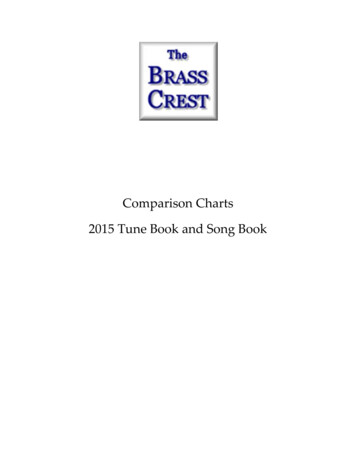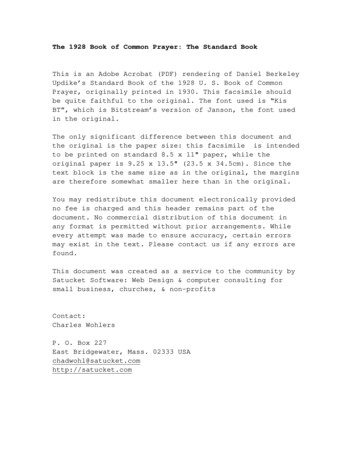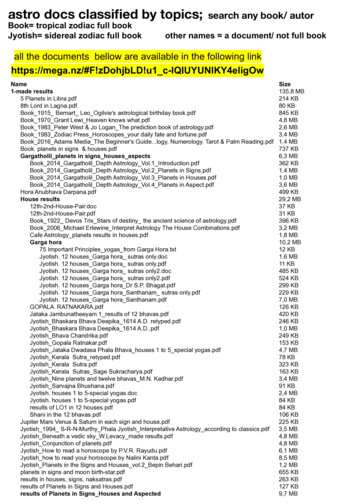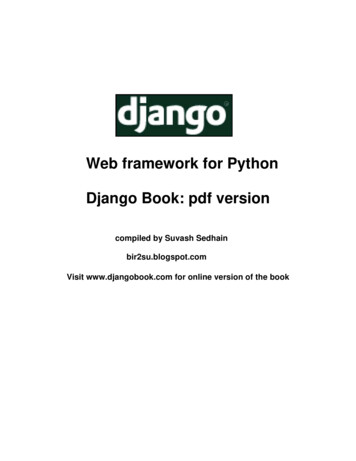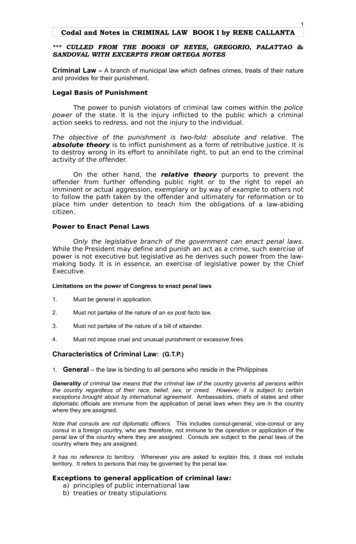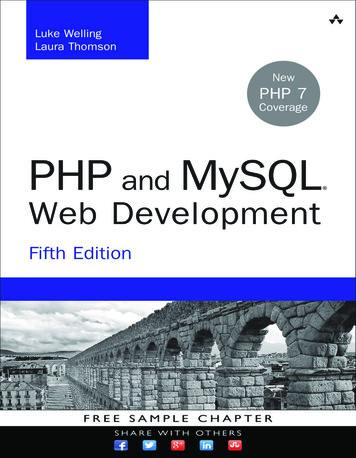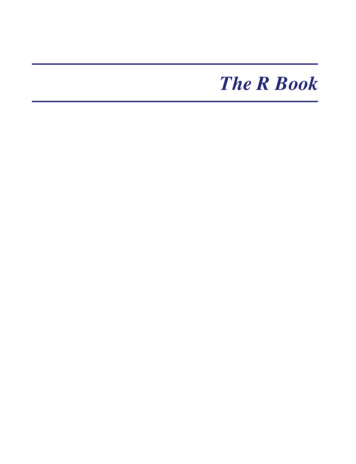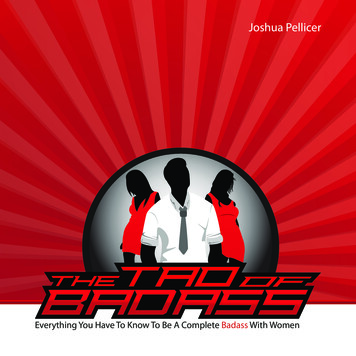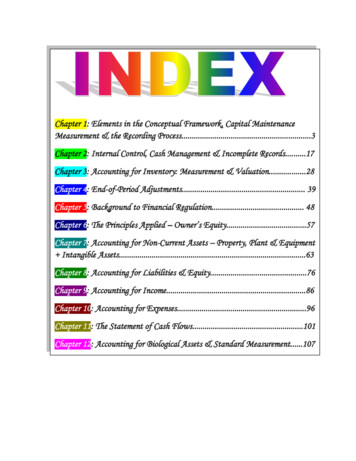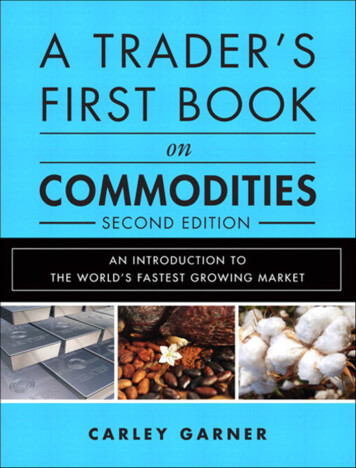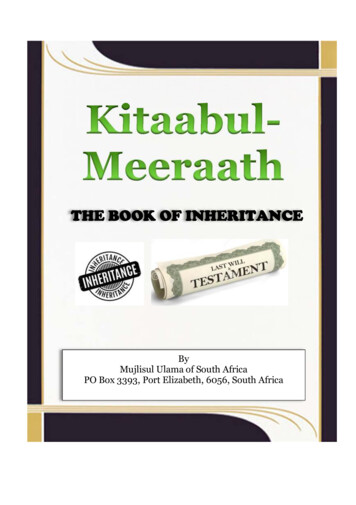
Transcription
THE BOOK OF INHERITANCEByMujlisul Ulama of South AfricaPO Box 3393, Port Elizabeth, 6056, South Africa
Kitaabul MeerathContentsINTRODUCTION . 7ILMUL FARA-IDH .9ABUSE AND VIOLATIONS. 13MEERAATH IS NOT DISCRETIONARY . 15WHAT TO DO IF THE WILL IS UN-ISLAMIC . 16DISPOSING OF THE ESTATE DURING ONE'S LIFETIME. 17WEALTH EXCLUDED FROM INHERITANCE. 19WEALTH WHICH WAS NOT ALIENATED . 21PRIOR RIGHTS .22BURIAL EXPENSES .23QARDH (DEBT) . 25THE KINDS OF QARDH . 25PAYMENT OF THE DEBT . 25THE THIRD CATEGORY OF DEBT . 28WARNING ON INCURRING DEBT UNNECESSARILY 28ADVICE TO THE HEIRS.29ADVICE TO THE CREDITORS . 30MARADHUL MAUT . 31THE EFFECTS OF TASARRUFAT (OPERATIONS)DURING MARADHUL MAUT . 33WASIYYAT . 38MASAA-IL .39THE KINDS OF WASIYYAT .42WAAJIB WASIYYAT (COMPULSORY) .422
Kitaabul MeerathMUSTAHAB WASIYYAT (PREFERABLE) .42JA-IZ WASIYYAT (PERMISSIBLE) .43HARAM WASIYYAT (UNLAWFUL) .43EXECUTING THE WASIYYAT .44NOTE: .49REVOKING A WASIYYAT.49THE WASI (Executor) . 50FACTORS WHICH DEPRIVE HEIRS OF INHERITANCE. 51KILLING THE MURITH . 51DIFFERENCE OF RELIGION . 52SLAVERY . 53DIFFERENCE OF COUNTRIES . 53SIMULTANEOUS DEATHS . 54NUBUWWAT . 54FACTORS WHICH DO NOT DEPRIVE HEIRS OF THEIRINHERITANCE . 55MARRIAGE OF A WIDOW . 55DISOBEDIENCE . 55INFANCY . 56HUJUB (DEPRIVATION) . 56HUJUB NUQSAN . 57TYPES OF RELATIONSHIP BETWEEN BROTHERS ANDSISTERS .58HUJUB HIRMAN .58AKHYAFI BROTHERS AND SISTERS: . 59GRANDCHILDREN (SON'S CHILDREN): . 593
Kitaabul MeerathGREAT-GRANDCHILDREN (SON'S SON'S CHILDREN):. 59GRANDDAUGHTER (SON'S DAUGHTER): . 59PATERNAL AND MATERNAL GRANDMOTHERS: . 59PATERNAL GRANDMOTHER: . 59BROTHERS AND SISTERS: . 59AL-LATI SISTER: . 59PATERNAL GRANDFATHER: . 60BROTHER'S SON: . 60PATERNAL UNCLE: . 60RELATIVES WHO ARE NOT HEIRS. 60ADOPTION . 61AN ESTRANGED WIFE. 61THE ILL-BEGOTTEN CHILDREN OF AN ESTRANGEDWIFE .62THE MAYYIT'S ESTATE .63THE HEIRS .63ZAWIL FUROODH .64FATHER: .64PATERNAL GRANDFATHER: . 65AKHYAFI BROTHERS: . 67HUSBAND: . 67WIFE: . 68MOTHER: .69DAUGHTERS: .70GRANDDAUGHTERS: . 714
Kitaabul MeerathHAQEEQI (TRUE OR FULL) SISTERS . 73AL-LATI SISTERS . 74AKHYAFI SISTERS . 75GRANDMOTHER: . 75ASBAT . 77ASBAT-E-NASABIYYAH . 78ASBAH BINAFSIHI . 78ASBAH BIGHAYRIHI . 80ASBAH MA'A GHAYRIHI . 81ASBAT SABABIYYAH . 82FURTHER EXPLANATION ON THE ASBAT BY WAY OFEXAMPLES. 82RADD . 86AUL .92ZAWIL ARHAM . 95THE CATEGORIES OF ZAWIL ARHAM IN GREATERDETAIL . 98KHUNTHA . 121THE UNBORN BABY. 123MAULA MUWALAT . 130MUQAR LAHU BIN NASAB ALAL GHAIR . 131MUSA LAHU . 135BAITUL MAL . 135DEATH OF THE MUSAFIR . 136THE LA-WARITH . 136THE MAFQOOD . 1375
Kitaabul MeerathTHE MURTAD . 140MUNASAKHAH . 140THE ESTATE OF THE MAYYIT . 143THE MAYYIT'S CLOTHES . 144THE MAYYIT'S BUSINESS . 145IF STOCK WAS NOT TAKEN. 148THE MAYYIT'S VEHICLES . 149DISTRIBUTING THE ASSETS . 149FIXED PROPERTY . 150THE MUSLIM'S LAST TESTAMENT. 152ADVICE FOR SOUTH AFRICAN MUSLIMS . 153THE MATRIMONIAL ACT – HOW IT AFFECTS MUSLIMS. 154MISCELLANEOUS . 158INHERITANCE BY DUAL RELATIONSHIP . 159WHEN AN HEIR CANNOT BE IDENTIFIED . 160EXAMPLES FOR ALL . 162QUESTIONS AND ANSWERS . 2166
Kitaabul MeerathINTRODUCTIONKitaabul Meeraath (The Book of Inheritance) is an attemptto explain Islamic Inheritance to ordinary Muslims. Thissubject which concerns every Muslim is about the mostneglected branch of Islamic Knowledge. Most Muslims aregrossly ignorant of the Ahkam (laws) of inheritance. Evenpious and learned people commit grave errors in this matter.Muslims largely ignorant of the Shariah's demandspertaining to inheritance, direct the distribution of theirestates in accordance with the unfettered freedom or interms of certain restrictions of western Kuffar law. Havingopted ignorantly for some western matrimonial propertysystem, Muslims are precluded from drawing up IslamicWills. Others again, simply do not care of the direconsequences awaiting them in the Akhirah, hence theybequeath their estates as directed by their whimsical desires.Kitaabul Meeraath deals with both the Shar'i legal and moralaspects pertaining to inheritance. It is hoped that AllahTa'ala will make this humble effort a means of hidayat(guidance) for Muslims so that they understand the gravityof their transgressions in the sphere of inheritance.Although effort has been made to simplify this subject, weare aware that many Muslims will find it difficult tocomprehend the many rules of inheritance. UndoubtedlyMeeraath is a difficult subject with its numerous differentcases, classes and categories being somewhat confusing.While this book will assist in giving a better understandingof the workings and importance of Meeraath, it is necessaryfor the layman to consult with an Alim who is proficient inthis subject, before effecting the distribution of the estate.7
Kitaabul MeerathThe Qur'an Majeed and the Ahadith of Rasulullah (SallallahuAlayhi Wassallam) apply great emphasis on the importanceof Meeraath. It does, therefore, not behove the Muslim todepart from this transitory abode with the accursed burdenof the transgression which he has loaded onto himself byway of his unjust violation of Allah's orders of inheritance.Mujlisul Ulama of South AfricaP.O. Box 3393Port Elizabeth 6056South Africa8
Kitaabul MeerathILMUL FARA-IDH(Knowledge of Inheritance)Fara-idh is the plural of Fareedhah which literally meanssomething which has been fixed or determined. Since theQur'an Majeed has fixed the shares of the different heirs inthe estate of the Murith (the deceased whose estate theyinherit), this branch of knowledge is called Fara-idh.Inheritance is called Meeraath.The Qur'an and Hadith place great emphasis on theknowledge of Meeraath and Fara-idh. Rasulullah (Sallallahualayhi wasallam) exhorted much the acquisition andteaching of Ilmul Fara-idh. In this regard he said:"I shall be taken away. Learn Fara-idh and teach it (toothers). The time is near for the door of Wahi to be closed.The time for the disappearance of knowledge will dawnwhen two persons will dispute regarding a necessarymas'alah (deeni question) and they will find no one todecide the dispute."Speaking on the virtues of Fara-idh, Rasulullah (Sallallahualayhi wasallam) said:"O people! Learn Fara-idh. It is half of knowledge."In view of the importance and significance of inheritance, itsknowledge is described as 'half of knowledge'.Regarding the disappearance of this knowledge, Rasulullah(Sallallahu alayhi wasallam) predicted:9
Kitaabul Meerath"The first (branch of) knowledge which will be taken awayfrom my Ummah will be Ilmul Fara-idh."Emphasising the importance of Ilmul Fara-idh, HadhratUmar (radhiallahu anhu) said:"O people! Learn Fara-idh with the same concern and effortwith which you learn the Qur'an.""O Muslims! Learn Fara-idh. It is an essential part of theknowledge of your Deen."Hadhrat Abu Musa (radhiallahu anhu) said:"Whoever has learnt the Qur'an, but not Fara-idh is like ahead without a face."Allah Ta'ala, by his infinite mercy brought man intoexistence from the state of pure non-existence and placedhim on earth to live here for a short while. For his earthlysojourn, his Creator, Rabbul Alameen, bestowed a variety ofmaterial provisions to him. These provisions for sustaininghis earthly life have been awarded to man temporarily. Thewealth, property, garments and whatever have been assignedto his custody are not his property. He is not the owner ofthese divine bestowals. Their only owner is Allah Azza Wajal,the Creator, Sovereign and Owner of the Universe. Nothingin man's possession belongs to him.When man's term of life comes to an end, the bounties whichwere on loan to him revert back to Allah Ta'ala, The Originaland True Owner. Hence, man is not permitted to dispose ofhis estate according to his wishes and desires. His outerfacade of ownership of 'his' possession ceases with death.Man, therefore has no right of operating in the wealth which10
Kitaabul Meerathwas bestowed to him for his benefit in this earthly sojourn.Upon his death the rights of others - the heirs - becomeautomatically related to the estate he left behind.Thus
Kitaabul Meeraath (The Book of Inheritance) is an attempt to explain Islamic Inheritance to ordinary Muslims. This subject which concerns every Muslim is about the most neglected branch of Islamic Knowledge. Most Muslims are grossly ignorant of the Ahkam (laws) of inheritance. Even pious and learned people commit grave errors in this matter. Muslims largely ignorant of the Shariah's demands .
